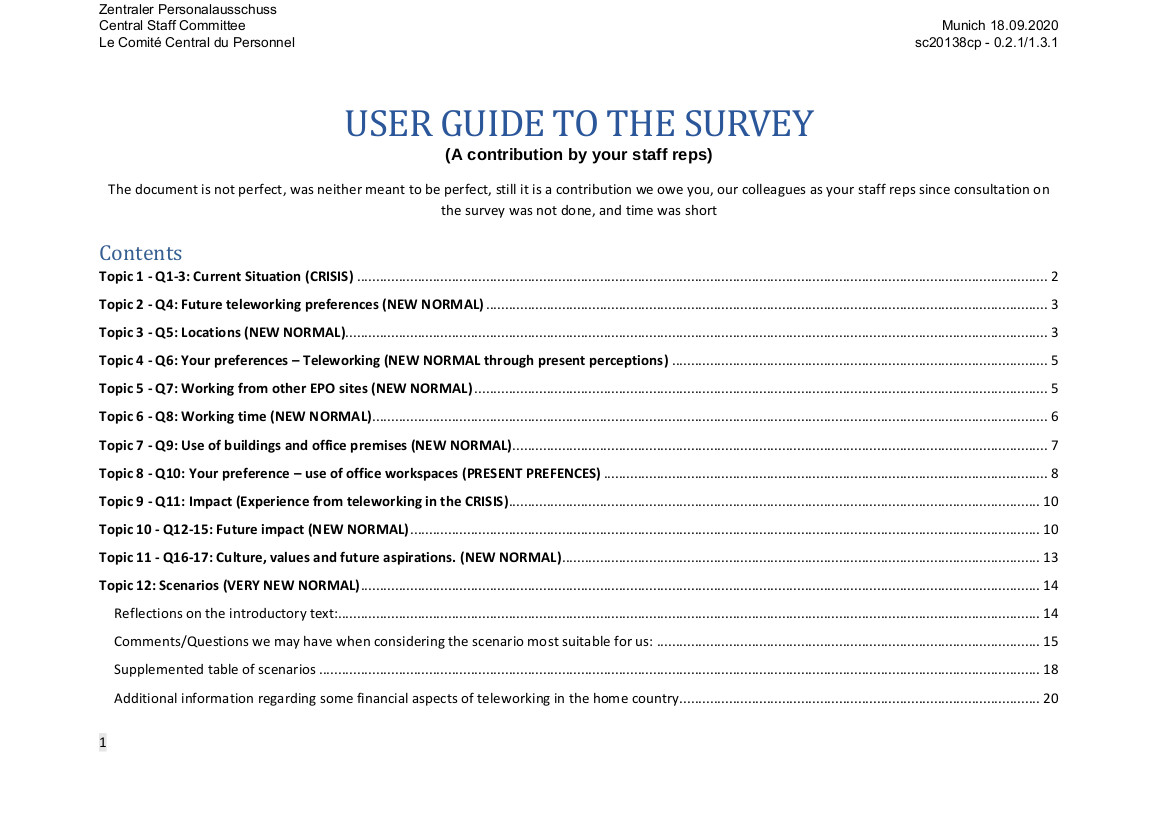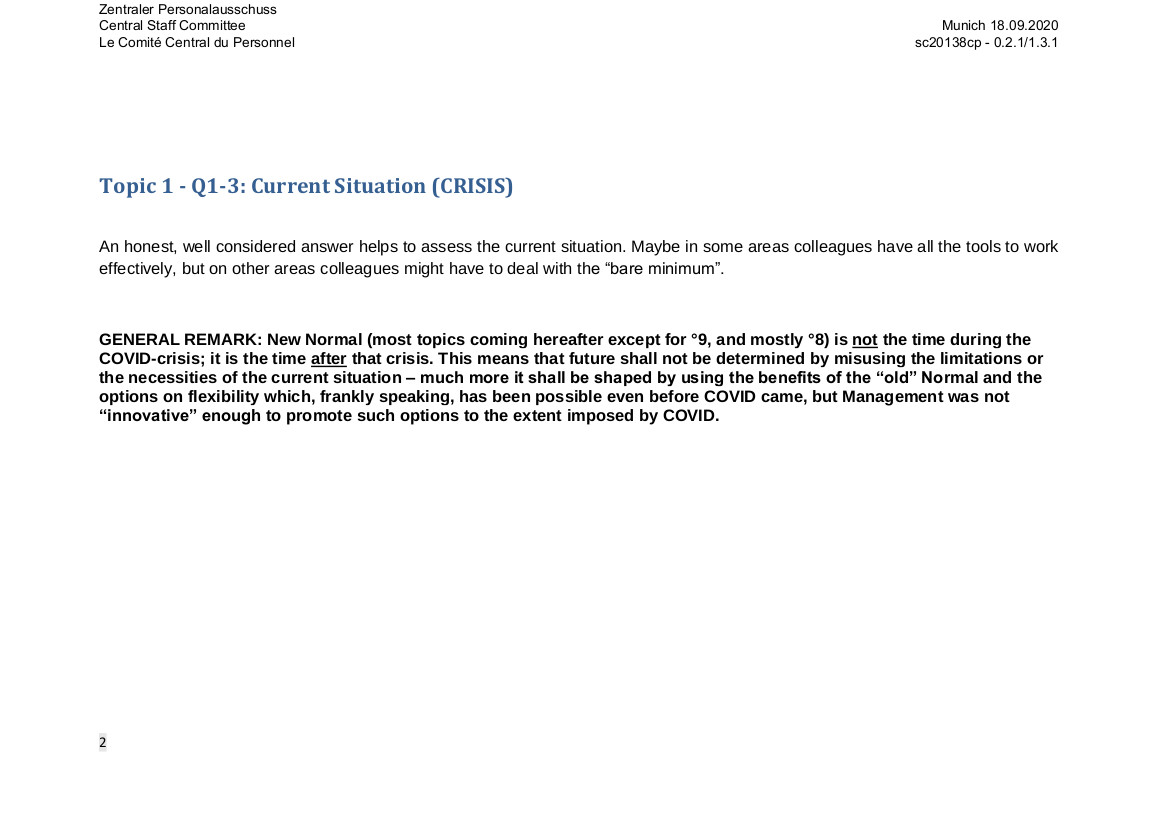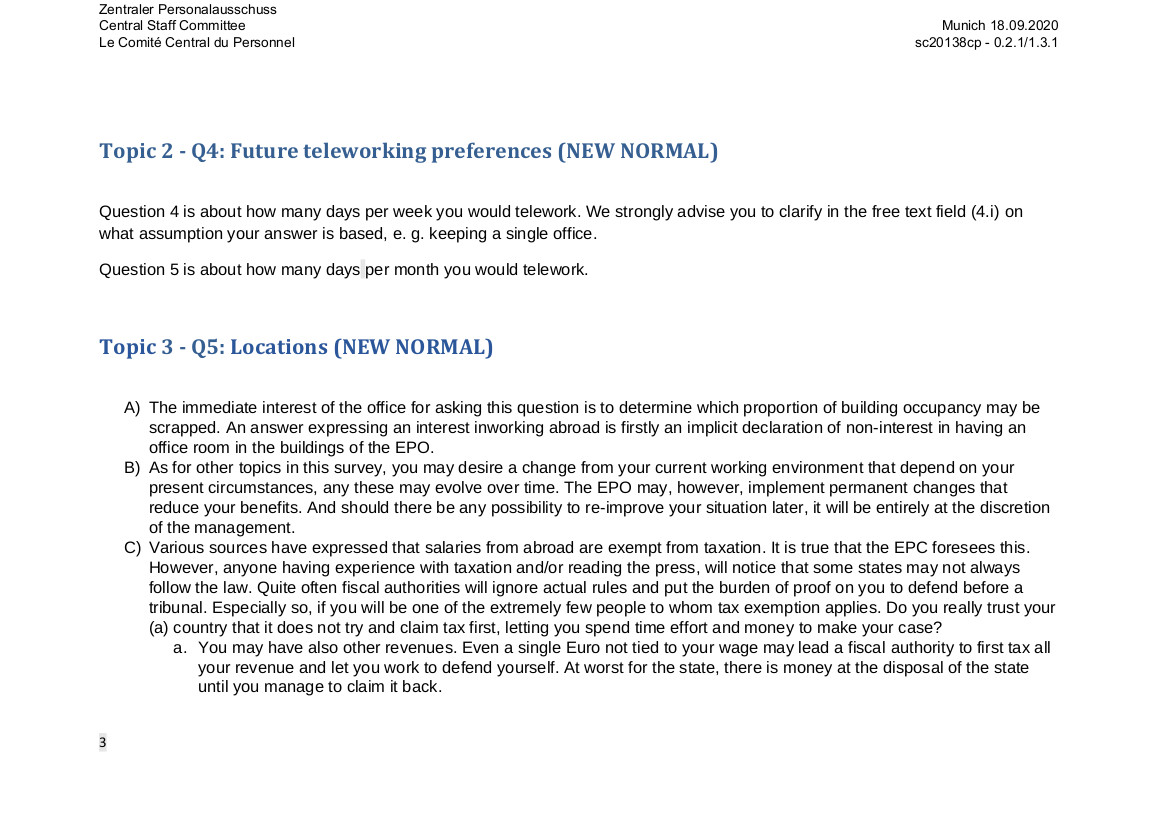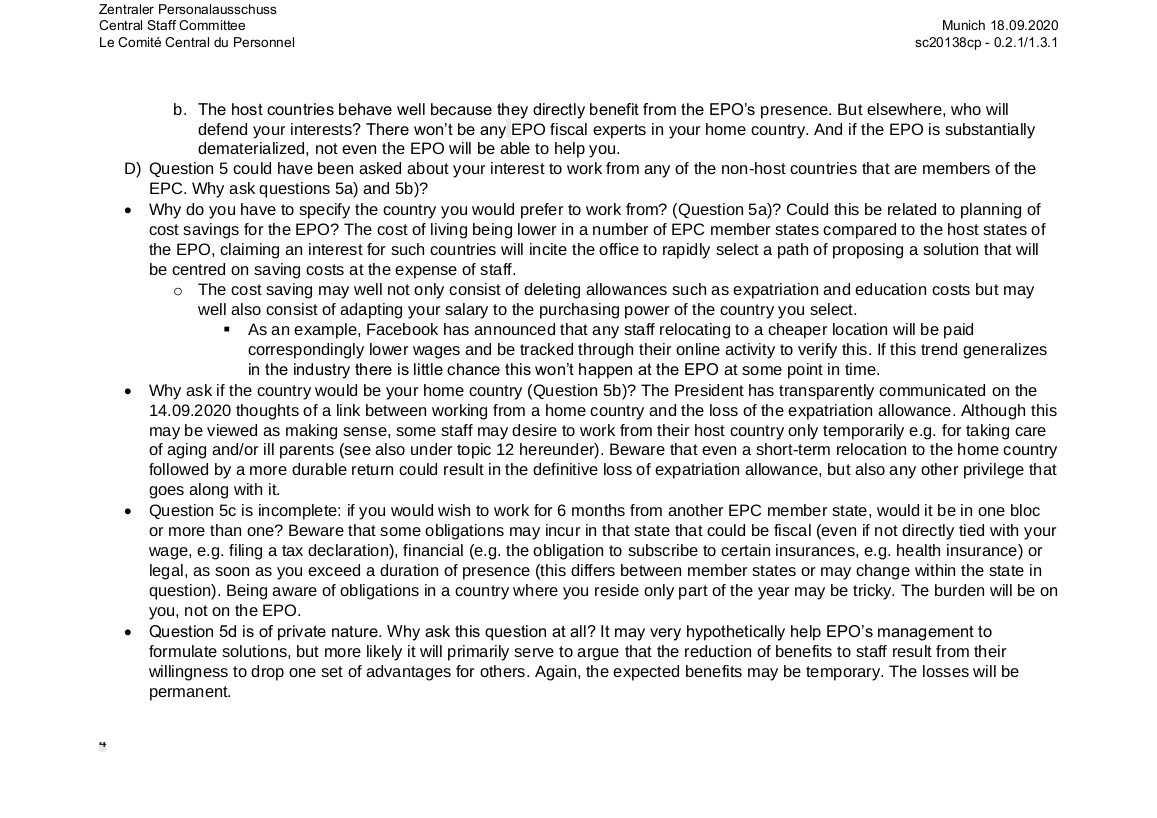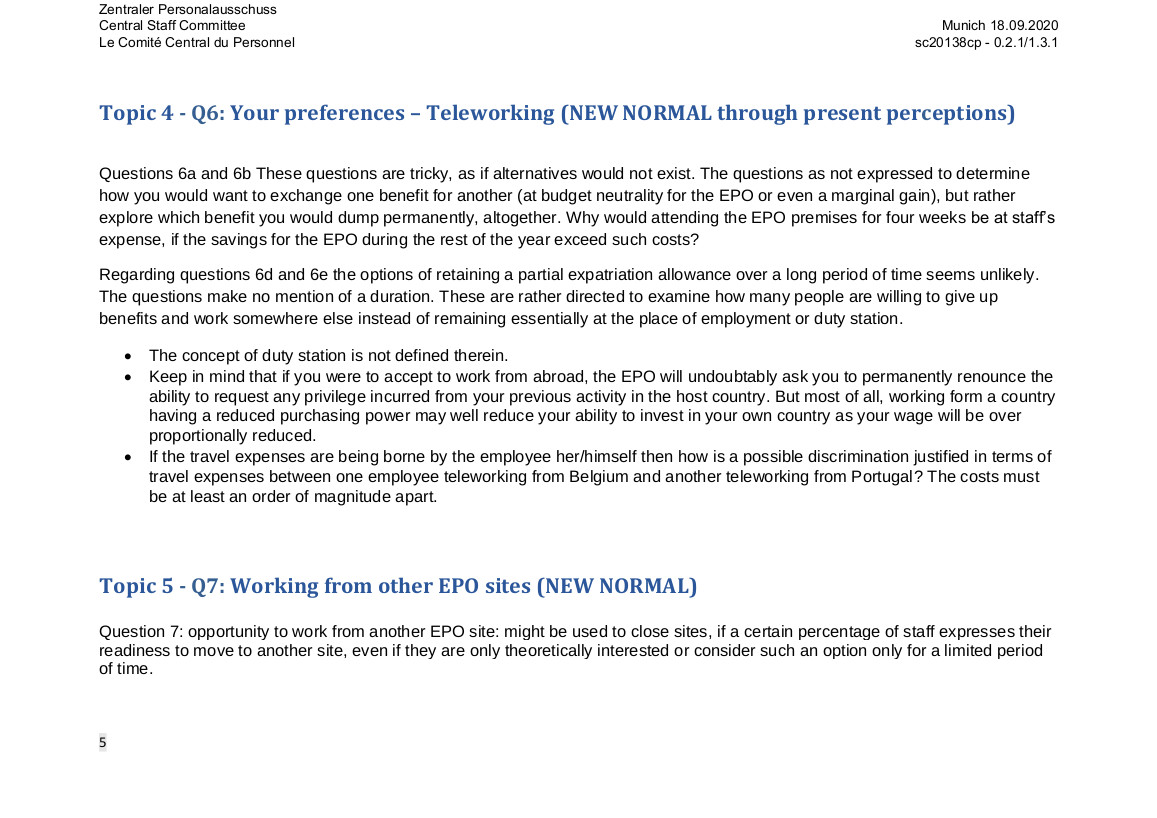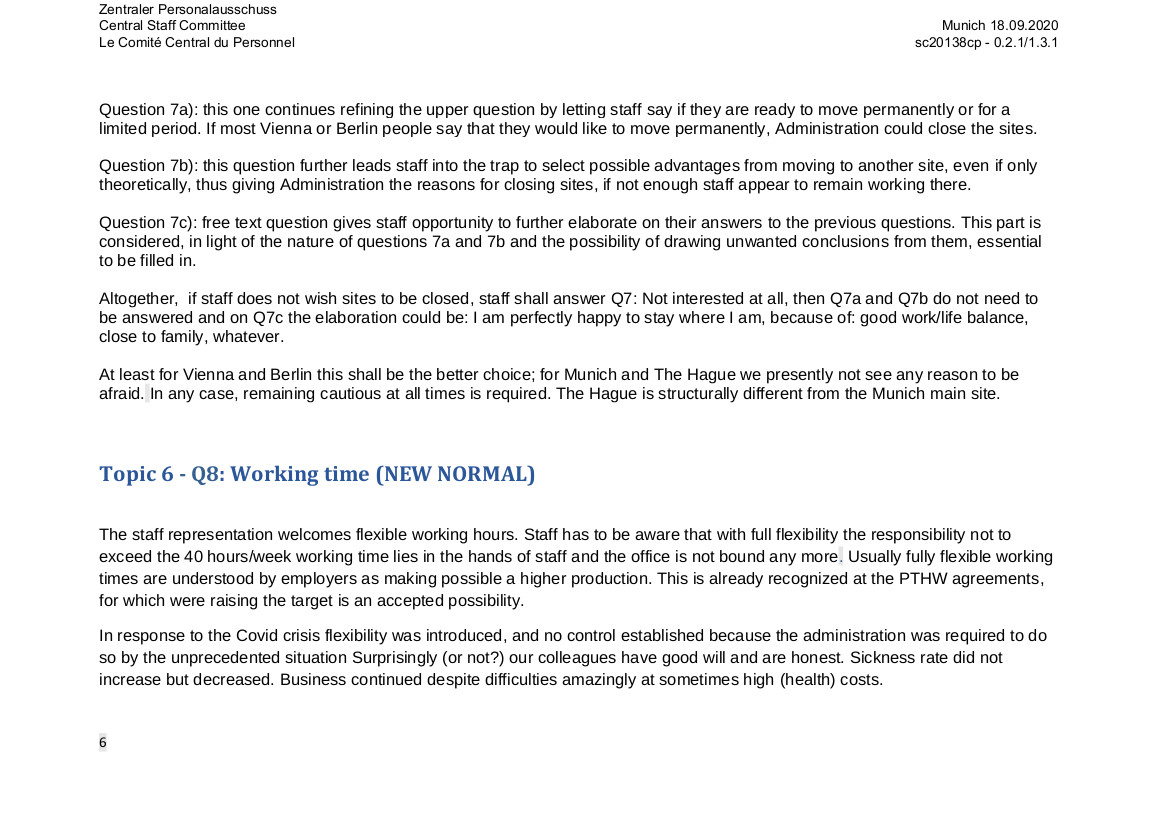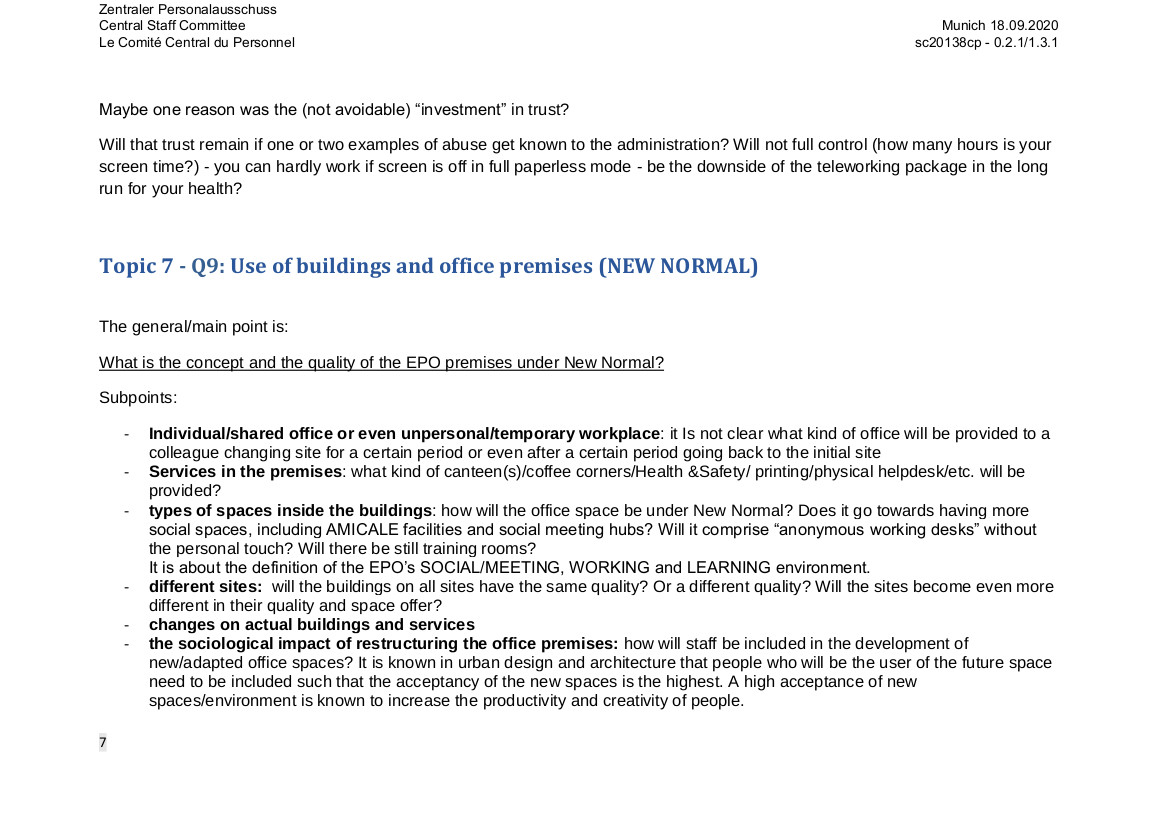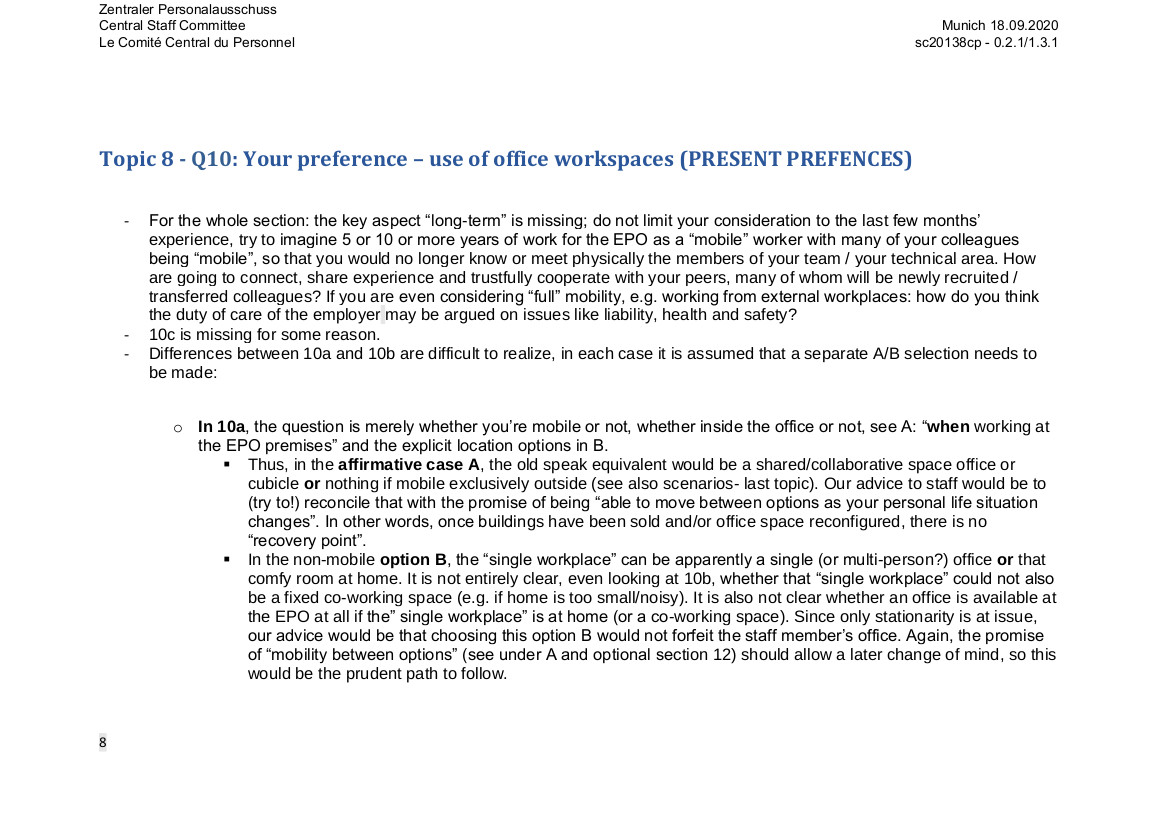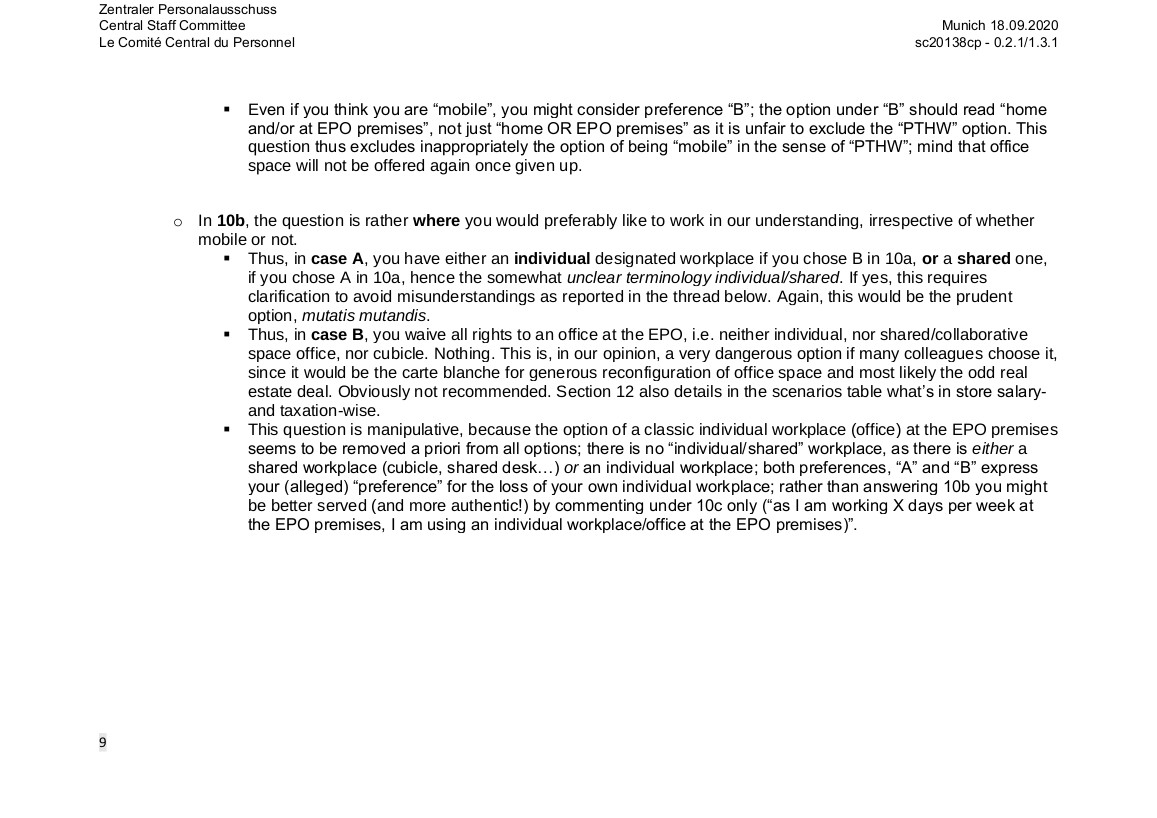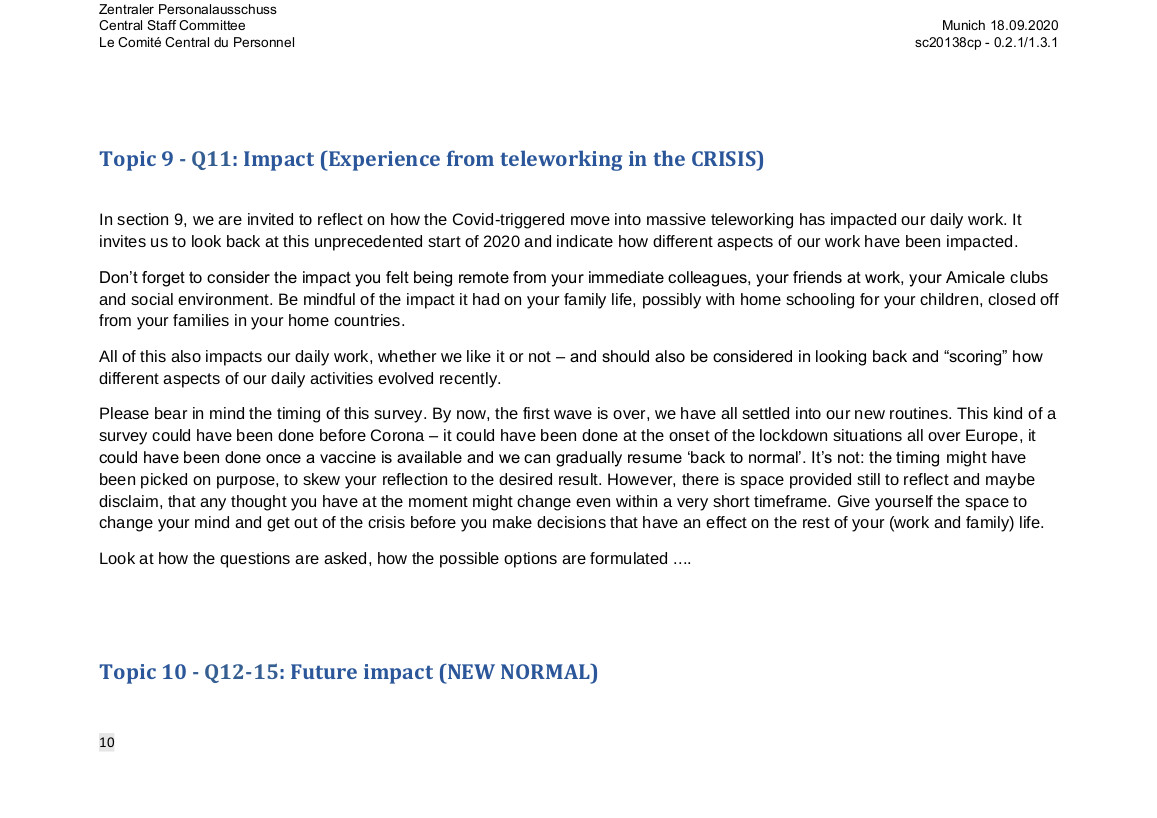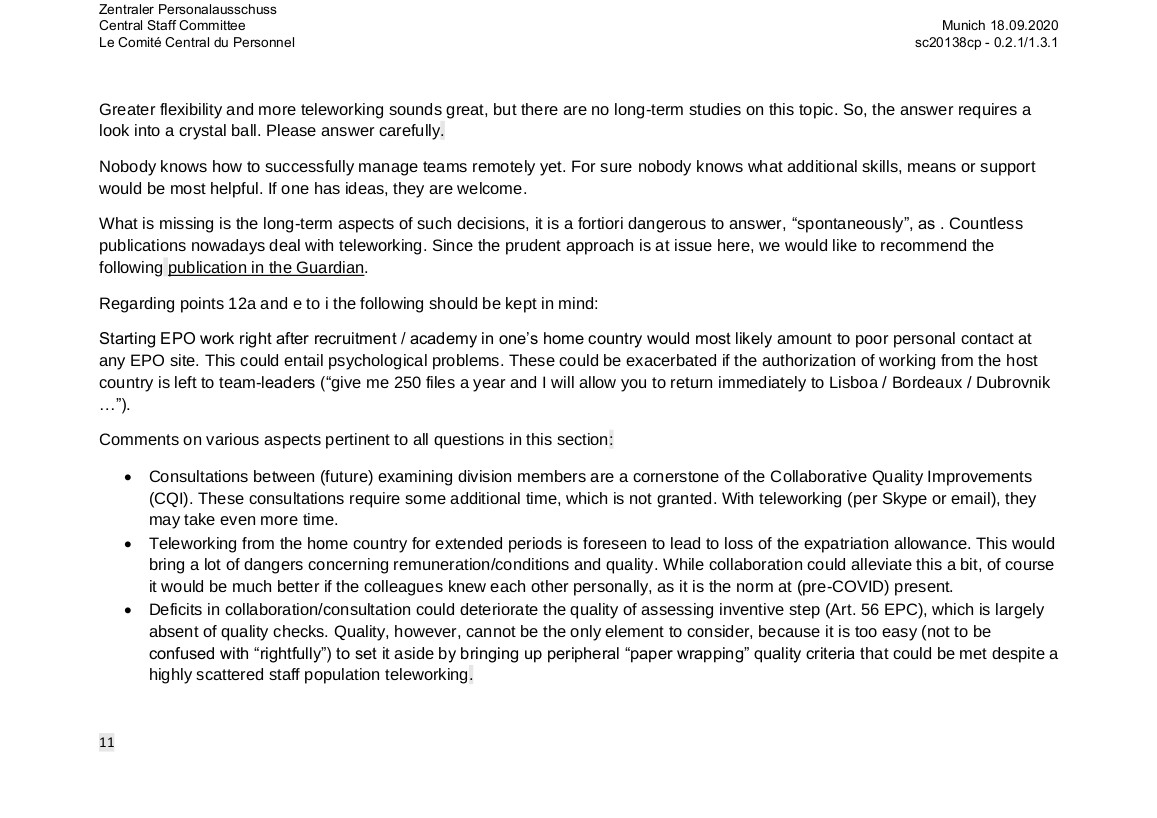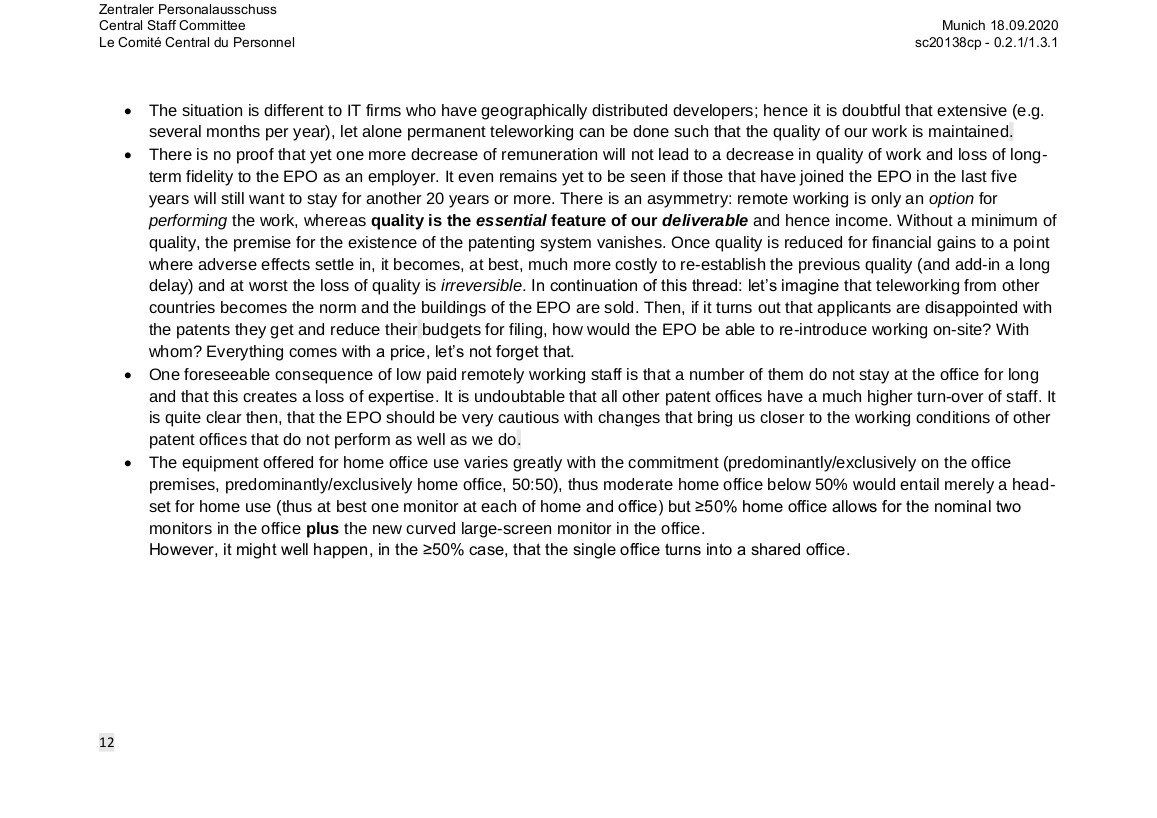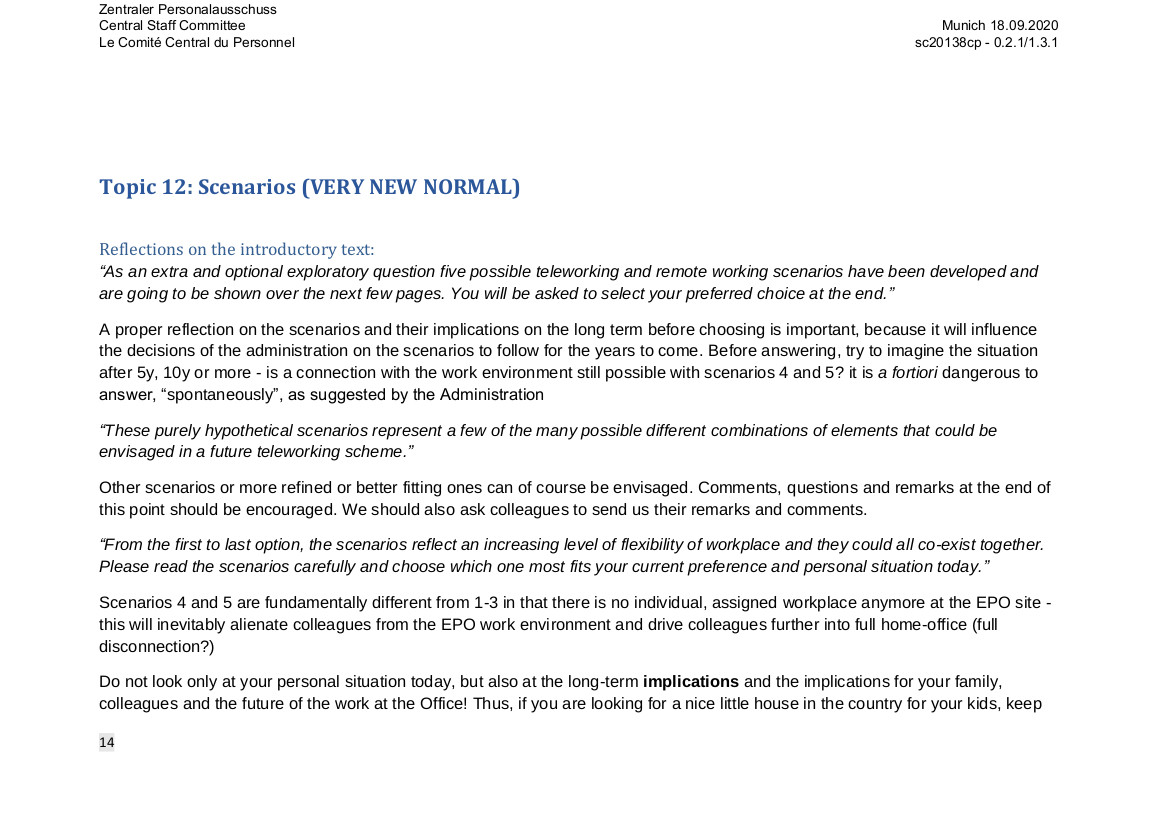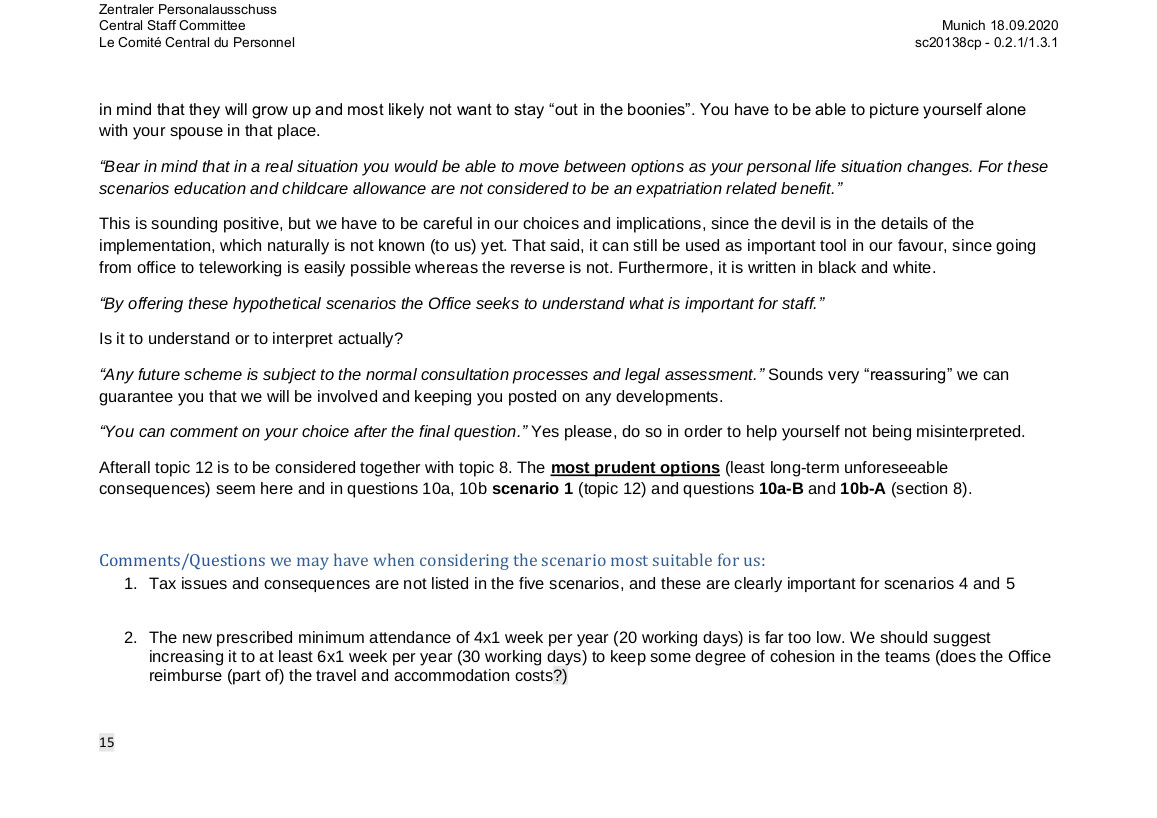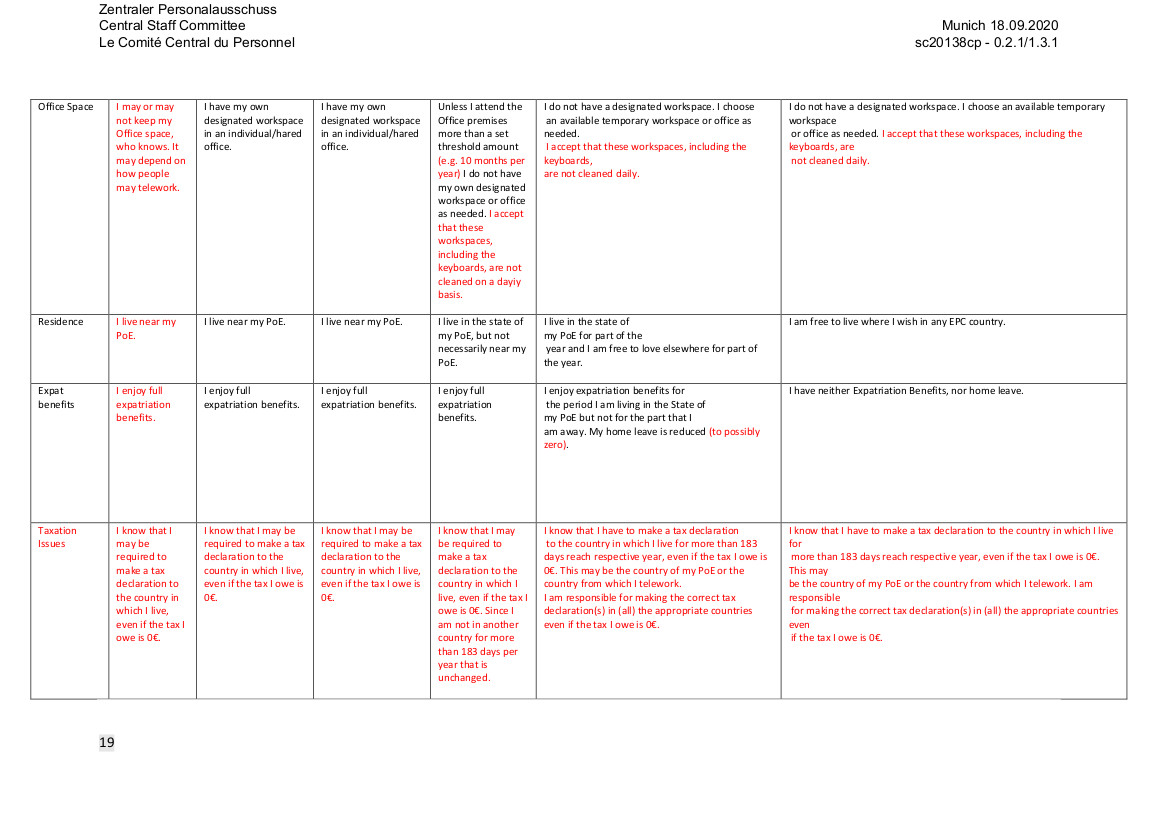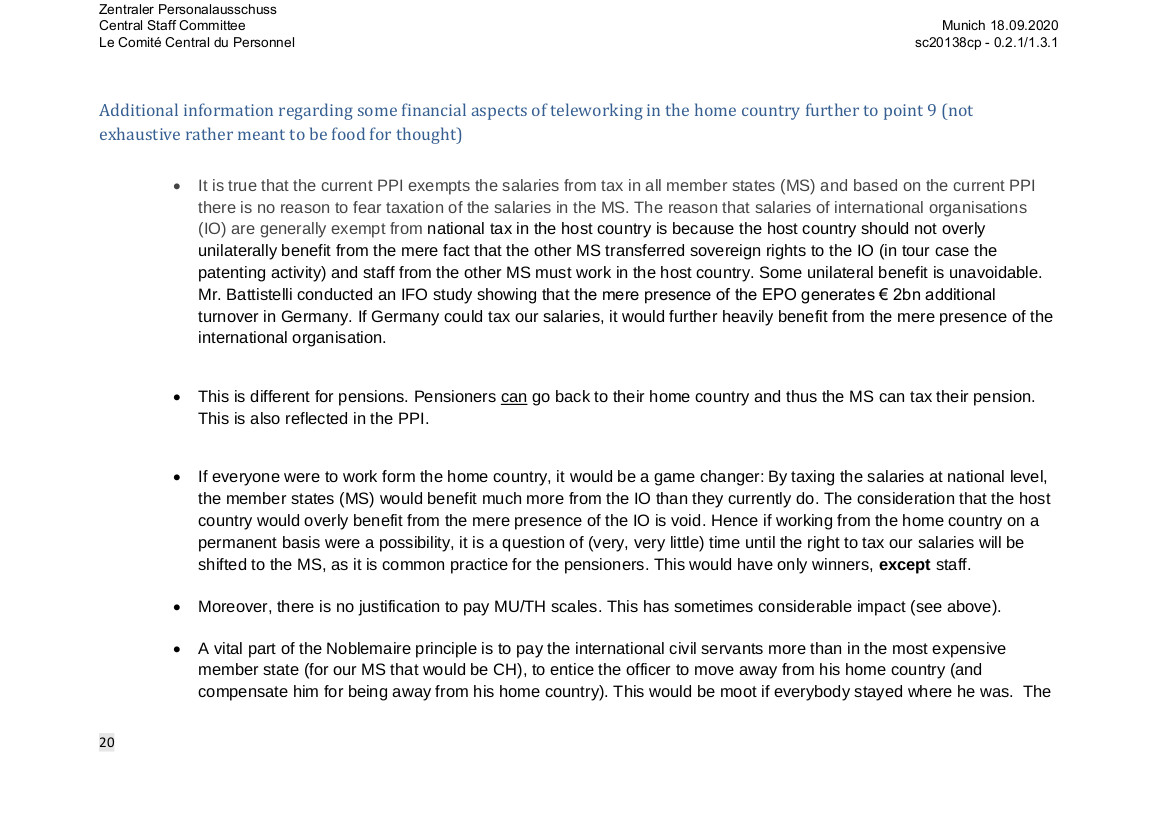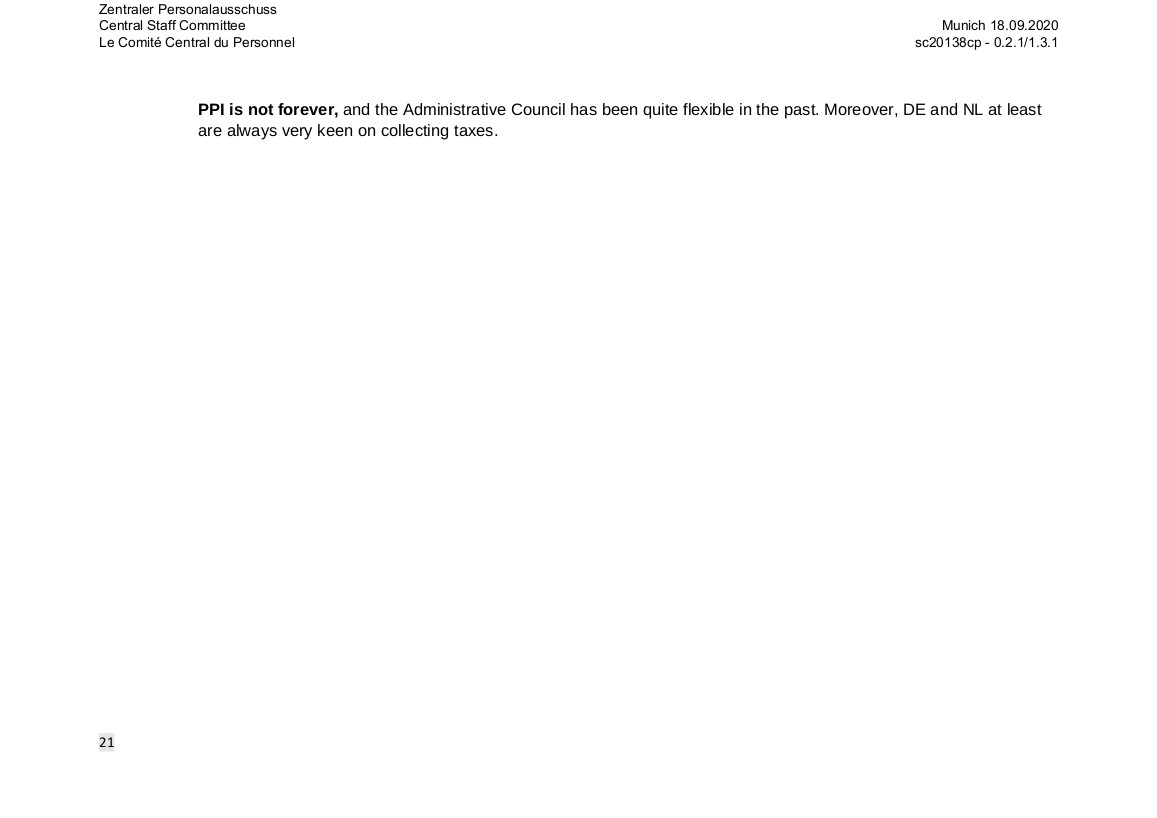More about the survey whose purpose is to make it seem like staff gave input (trick questions):
Zentraler Personalausschuss
Central Staff Committee
Le Comité Central du Personnel
Munich 18.09.2020
sc20138cp - 0.2.1/1.3.1
USER GUIDE TO THE SURVEY
(A contribution by your staff reps)
The document is not perfect, was neither meant to be perfect, still it is a contribution we owe you, our colleagues as your staff reps since consultation on
the survey was not done, and time was short
Contents
Topic 1 - Q1-3: Current Situation (CRISIS) ...................................................................................................................................................................................... 2
Topic 2 - Q4: Future teleworking preferences (NEW NORMAL) .................................................................................................................................................... 3
Topic 3 - Q5: Locations (NEW NORMAL)......................................................................................................................................................................................... 3
Topic 4 - Q6: Your preferences – Teleworking (NEW NORMAL through present perceptions) ................................................................................................... 5
Topic 5 - Q7: Working from other EPO sites (NEW NORMAL) ....................................................................................................................................................... 5
Topic 6 - Q8: Working time (NEW NORMAL).................................................................................................................................................................................. 6
Topic 7 - Q9: Use of buildings and office premises (NEW NORMAL)............................................................................................................................................. 7
Topic 8 - Q10: Your preference – use of office workspaces (PRESENT PREFENCES) ..................................................................................................................... 8
Topic 9 - Q11: Impact (Experience from teleworking in the CRISIS)............................................................................................................................................ 10
Topic 10 - Q12-15: Future impact (NEW NORMAL) ...................................................................................................................................................................... 10
Topic 11 - Q16-17: Culture, values and future aspirations. (NEW NORMAL).............................................................................................................................. 13
Topic 12: Scenarios (VERY NEW NORMAL) ................................................................................................................................................................................... 14
Reflections on the introductory text:......................................................................................................................................................................................... 14
Comments/Questions we may have when considering the scenario most suitable for us: ..................................................................................................... 15
Supplemented table of scenarios .............................................................................................................................................................................................. 18
Additional information regarding some financial aspects of teleworking in the home country............................................................................................... 20
1
Zentraler Personalausschuss
Central Staff Committee Munich 18.09.2020
Le Comité Central du Personnel sc20138cp - 0.2.1/1.3.1
Topic 1 - Q1-3: Current Situation (CRISIS)
An honest, well considered answer helps to assess the current situation. Maybe in some areas colleagues have all the tools to work
effectively, but on other areas colleagues might have to deal with the “bare minimum”.
GENERAL REMARK: New Normal (most topics coming hereafter except for €°9, and mostly €°8) is not the time during the
COVID-crisis; it is the time after that crisis. This means that future shall not be determined by misusing the limitations or
the necessities of the current situation – much more it shall be shaped by using the benefits of the “old” Normal and the
options on flexibility which, frankly speaking, has been possible even before COVID came, but Management was not
“innovative” enough to promote such options to the extent imposed by COVID.
2
Zentraler Personalausschuss
Central Staff Committee Munich 18.09.2020
Le Comité Central du Personnel sc20138cp - 0.2.1/1.3.1
Topic 2 - Q4: Future teleworking preferences (NEW NORMAL)
Question 4 is about how many days per week you would telework. We strongly advise you to clarify in the free text field (4.i) on
what assumption your answer is based, e. g. keeping a single office.
Question 5 is about how many days per month you would telework.
Topic 3 - Q5: Locations (NEW NORMAL)
A) The immediate interest of the office for asking this question is to determine which proportion of building occupancy may be
scrapped. An answer expressing an interest inworking abroad is firstly an implicit declaration of non-interest in having an
office room in the buildings of the EPO.
B) As for other topics in this survey, you may desire a change from your current working environment that depend on your
present circumstances, any these may evolve over time. The EPO may, however, implement permanent changes that
reduce your benefits. And should there be any possibility to re-improve your situation later, it will be entirely at the discretion
of the management.
C) Various sources have expressed that salaries from abroad are exempt from taxation. It is true that the EPC foresees this.
However, anyone having experience with taxation and/or reading the press, will notice that some states may not always
follow the law. Quite often fiscal authorities will ignore actual rules and put the burden of proof on you to defend before a
tribunal. Especially so, if you will be one of the extremely few people to whom tax exemption applies. Do you really trust your
(a) country that it does not try and claim tax first, letting you spend time effort and money to make your case?
a. You may have also other revenues. Even a single Euro not tied to your wage may lead a fiscal authority to first tax all
your revenue and let you work to defend yourself. At worst for the state, there is money at the disposal of the state
until you manage to claim it back.
3
Zentraler Personalausschuss
Central Staff Committee Munich 18.09.2020
Le Comité Central du Personnel sc20138cp - 0.2.1/1.3.1
b. The host countries behave well because they directly benefit from the EPO’s presence. But elsewhere, who will
defend your interests? There won’t be any EPO fiscal experts in your home country. And if the EPO is substantially
dematerialized, not even the EPO will be able to help you.
D) Question 5 could have been asked about your interest to work from any of the non-host countries that are members of the
EPC. Why ask questions 5a) and 5b)?
● Why do you have to specify the country you would prefer to work from? (Question 5a)? Could this be related to planning of
cost savings for the EPO? The cost of living being lower in a number of EPC member states compared to the host states of
the EPO, claiming an interest for such countries will incite the office to rapidly select a path of proposing a solution that will
be centred on saving costs at the expense of staff.
o The cost saving may well not only consist of deleting allowances such as expatriation and education costs but may
well also consist of adapting your salary to the purchasing power of the country you select.
â⪠As an example, Facebook has announced that any staff relocating to a cheaper location will be paid
correspondingly lower wages and be tracked through their online activity to verify this. If this trend generalizes
in the industry there is little chance this won’t happen at the EPO at some point in time.
● Why ask if the country would be your home country (Question 5b)? The President has transparently communicated on the
14.09.2020 thoughts of a link between working from a home country and the loss of the expatriation allowance. Although this
may be viewed as making sense, some staff may desire to work from their host country only temporarily e.g. for taking care
of aging and/or ill parents (see also under topic 12 hereunder). Beware that even a short-term relocation to the home country
followed by a more durable return could result in the definitive loss of expatriation allowance, but also any other privilege that
goes along with it.
● Question 5c is incomplete: if you would wish to work for 6 months from another EPC member state, would it be in one bloc
or more than one? Beware that some obligations may incur in that state that could be fiscal (even if not directly tied with your
wage, e.g. filing a tax declaration), financial (e.g. the obligation to subscribe to certain insurances, e.g. health insurance) or
legal, as soon as you exceed a duration of presence (this differs between member states or may change within the state in
question). Being aware of obligations in a country where you reside only part of the year may be tricky. The burden will be on
you, not on the EPO.
● Question 5d is of private nature. Why ask this question at all? It may very hypothetically help EPO’s management to
formulate solutions, but more likely it will primarily serve to argue that the reduction of benefits to staff result from their
willingness to drop one set of advantages for others. Again, the expected benefits may be temporary. The losses will be
permanent.
4
Zentraler Personalausschuss
Central Staff Committee Munich 18.09.2020
Le Comité Central du Personnel sc20138cp - 0.2.1/1.3.1
Topic 4 - Q6: Your preferences – Teleworking (NEW NORMAL through present perceptions)
Questions 6a and 6b These questions are tricky, as if alternatives would not exist. The questions as not expressed to determine
how you would want to exchange one benefit for another (at budget neutrality for the EPO or even a marginal gain), but rather
explore which benefit you would dump permanently, altogether. Why would attending the EPO premises for four weeks be at staff’s
expense, if the savings for the EPO during the rest of the year exceed such costs?
Regarding questions 6d and 6e the options of retaining a partial expatriation allowance over a long period of time seems unlikely.
The questions make no mention of a duration. These are rather directed to examine how many people are willing to give up
benefits and work somewhere else instead of remaining essentially at the place of employment or duty station.
● The concept of duty station is not defined therein.
● Keep in mind that if you were to accept to work from abroad, the EPO will undoubtably ask you to permanently renounce the
ability to request any privilege incurred from your previous activity in the host country. But most of all, working form a country
having a reduced purchasing power may well reduce your ability to invest in your own country as your wage will be over
proportionally reduced.
● If the travel expenses are being borne by the employee her/himself then how is a possible discrimination justified in terms of
travel expenses between one employee teleworking from Belgium and another teleworking from Portugal? The costs must
be at least an order of magnitude apart.
Topic 5 - Q7: Working from other EPO sites (NEW NORMAL)
Question 7: opportunity to work from another EPO site: might be used to close sites, if a certain percentage of staff expresses their
readiness to move to another site, even if they are only theoretically interested or consider such an option only for a limited period
of time.
5
Zentraler Personalausschuss
Central Staff Committee Munich 18.09.2020
Le Comité Central du Personnel sc20138cp - 0.2.1/1.3.1
Question 7a): this one continues refining the upper question by letting staff say if they are ready to move permanently or for a
limited period. If most Vienna or Berlin people say that they would like to move permanently, Administration could close the sites.
Question 7b): this question further leads staff into the trap to select possible advantages from moving to another site, even if only
theoretically, thus giving Administration the reasons for closing sites, if not enough staff appear to remain working there.
Question 7c): free text question gives staff opportunity to further elaborate on their answers to the previous questions. This part is
considered, in light of the nature of questions 7a and 7b and the possibility of drawing unwanted conclusions from them, essential
to be filled in.
Altogether, if staff does not wish sites to be closed, staff shall answer Q7: Not interested at all, then Q7a and Q7b do not need to
be answered and on Q7c the elaboration could be: I am perfectly happy to stay where I am, because of: good work/life balance,
close to family, whatever.
At least for Vienna and Berlin this shall be the better choice; for Munich and The Hague we presently not see any reason to be
afraid. In any case, remaining cautious at all times is required. The Hague is structurally different from the Munich main site.
Topic 6 - Q8: Working time (NEW NORMAL)
The staff representation welcomes flexible working hours. Staff has to be aware that with full flexibility the responsibility not to
exceed the 40 hours/week working time lies in the hands of staff and the office is not bound any more. Usually fully flexible working
times are understood by employers as making possible a higher production. This is already recognized at the PTHW agreements,
for which were raising the target is an accepted possibility.
In response to the Covid crisis flexibility was introduced, and no control established because the administration was required to do
so by the unprecedented situation Surprisingly (or not?) our colleagues have good will and are honest. Sickness rate did not
increase but decreased. Business continued despite difficulties amazingly at sometimes high (health) costs.
6
Zentraler Personalausschuss
Central Staff Committee Munich 18.09.2020
Le Comité Central du Personnel sc20138cp - 0.2.1/1.3.1
Maybe one reason was the (not avoidable) “investment” in trust?
Will that trust remain if one or two examples of abuse get known to the administration? Will not full control (how many hours is your
screen time?) - you can hardly work if screen is off in full paperless mode - be the downside of the teleworking package in the long
run for your health?
Topic 7 - Q9: Use of buildings and office premises (NEW NORMAL)
The general/main point is:
What is the concept and the quality of the EPO premises under New Normal?
Subpoints:
- Individual/shared office or even unpersonal/temporary workplace: it Is not clear what kind of office will be provided to a
colleague changing site for a certain period or even after a certain period going back to the initial site
- Services in the premises: what kind of canteen(s)/coffee corners/Health &Safety/ printing/physical helpdesk/etc. will be
provided?
- types of spaces inside the buildings: how will the office space be under New Normal? Does it go towards having more
social spaces, including AMICALE facilities and social meeting hubs? Will it comprise “anonymous working desks” without
the personal touch? Will there be still training rooms?
It is about the definition of the EPO’s SOCIAL/MEETING, WORKING and LEARNING environment.
- different sites: will the buildings on all sites have the same quality? Or a different quality? Will the sites become even more
different in their quality and space offer?
- changes on actual buildings and services
- the sociological impact of restructuring the office premises: how will staff be included in the development of
new/adapted office spaces? It is known in urban design and architecture that people who will be the user of the future space
need to be included such that the acceptancy of the new spaces is the highest. A high acceptance of new
spaces/environment is known to increase the productivity and creativity of people.
7
Zentraler Personalausschuss
Central Staff Committee Munich 18.09.2020
Le Comité Central du Personnel sc20138cp - 0.2.1/1.3.1
Topic 8 - Q10: Your preference – use of office workspaces (PRESENT PREFENCES)
- For the whole section: the key aspect “long-term” is missing; do not limit your consideration to the last few months’
experience, try to imagine 5 or 10 or more years of work for the EPO as a “mobile” worker with many of your colleagues
being “mobile”, so that you would no longer know or meet physically the members of your team / your technical area. How
are going to connect, share experience and trustfully cooperate with your peers, many of whom will be newly recruited /
transferred colleagues? If you are even considering “full” mobility, e.g. working from external workplaces: how do you think
the duty of care of the employer may be argued on issues like liability, health and safety?
- 10c is missing for some reason.
- Differences between 10a and 10b are difficult to realize, in each case it is assumed that a separate A/B selection needs to
be made:
o In 10a, the question is merely whether you’re mobile or not, whether inside the office or not, see A: “when working at
the EPO premises” and the explicit location options in B.
â⪠Thus, in the affirmative case A, the old speak equivalent would be a shared/collaborative space office or
cubicle or nothing if mobile exclusively outside (see also scenarios- last topic). Our advice to staff would be to
(try to!) reconcile that with the promise of being “able to move between options as your personal life situation
changes”. In other words, once buildings have been sold and/or office space reconfigured, there is no
“recovery point”.
â⪠In the non-mobile option B, the “single workplace” can be apparently a single (or multi-person?) office or that
comfy room at home. It is not entirely clear, even looking at 10b, whether that “single workplace” could not also
be a fixed co-working space (e.g. if home is too small/noisy). It is also not clear whether an office is available at
the EPO at all if the” single workplace” is at home (or a co-working space). Since only stationarity is at issue,
our advice would be that choosing this option B would not forfeit the staff member’s office. Again, the promise
of “mobility between options” (see under A and optional section 12) should allow a later change of mind, so this
would be the prudent path to follow.
8
Zentraler Personalausschuss
Central Staff Committee Munich 18.09.2020
Le Comité Central du Personnel sc20138cp - 0.2.1/1.3.1
â⪠Even if you think you are “mobile”, you might consider preference “B”; the option under “B” should read “home
and/or at EPO premises”, not just “home OR EPO premises” as it is unfair to exclude the “PTHW” option. This
question thus excludes inappropriately the option of being “mobile” in the sense of “PTHW”; mind that office
space will not be offered again once given up.
o In 10b, the question is rather where you would preferably like to work in our understanding, irrespective of whether
mobile or not.
â⪠Thus, in case A, you have either an individual designated workplace if you chose B in 10a, or a shared one,
if you chose A in 10a, hence the somewhat unclear terminology individual/shared. If yes, this requires
clarification to avoid misunderstandings as reported in the thread below. Again, this would be the prudent
option, mutatis mutandis.
â⪠Thus, in case B, you waive all rights to an office at the EPO, i.e. neither individual, nor shared/collaborative
space office, nor cubicle. Nothing. This is, in our opinion, a very dangerous option if many colleagues choose it,
since it would be the carte blanche for generous reconfiguration of office space and most likely the odd real
estate deal. Obviously not recommended. Section 12 also details in the scenarios table what’s in store salary-
and taxation-wise.
â⪠This question is manipulative, because the option of a classic individual workplace (office) at the EPO premises
seems to be removed a priori from all options; there is no “individual/shared” workplace, as there is either a
shared workplace (cubicle, shared desk...) or an individual workplace; both preferences, “A” and “B” express
your (alleged) “preference” for the loss of your own individual workplace; rather than answering 10b you might
be better served (and more authentic!) by commenting under 10c only (“as I am working X days per week at
the EPO premises, I am using an individual workplace/office at the EPO premises)”.
9
Zentraler Personalausschuss
Central Staff Committee Munich 18.09.2020
Le Comité Central du Personnel sc20138cp - 0.2.1/1.3.1
Topic 9 - Q11: Impact (Experience from teleworking in the CRISIS)
In section 9, we are invited to reflect on how the Covid-triggered move into massive teleworking has impacted our daily work. It
invites us to look back at this unprecedented start of 2020 and indicate how different aspects of our work have been impacted.
Don’t forget to consider the impact you felt being remote from your immediate colleagues, your friends at work, your Amicale clubs
and social environment. Be mindful of the impact it had on your family life, possibly with home schooling for your children, closed off
from your families in your home countries.
All of this also impacts our daily work, whether we like it or not – and should also be considered in looking back and “scoring” how
different aspects of our daily activities evolved recently.
Please bear in mind the timing of this survey. By now, the first wave is over, we have all settled into our new routines. This kind of a
survey could have been done before Corona – it could have been done at the onset of the lockdown situations all over Europe, it
could have been done once a vaccine is available and we can gradually resume ‘back to normal’. It’s not: the timing might have
been picked on purpose, to skew your reflection to the desired result. However, there is space provided still to reflect and maybe
disclaim, that any thought you have at the moment might change even within a very short timeframe. Give yourself the space to
change your mind and get out of the crisis before you make decisions that have an effect on the rest of your (work and family) life.
Look at how the questions are asked, how the possible options are formulated ....
Topic 10 - Q12-15: Future impact (NEW NORMAL)
10
Zentraler Personalausschuss
Central Staff Committee Munich 18.09.2020
Le Comité Central du Personnel sc20138cp - 0.2.1/1.3.1
Greater flexibility and more teleworking sounds great, but there are no long-term studies on this topic. So, the answer requires a
look into a crystal ball. Please answer carefully.
Nobody knows how to successfully manage teams remotely yet. For sure nobody knows what additional skills, means or support
would be most helpful. If one has ideas, they are welcome.
What is missing is the long-term aspects of such decisions, it is a fortiori dangerous to answer, “spontaneously”, as . Countless
publications nowadays deal with teleworking. Since the prudent approach is at issue here, we would like to recommend the
following publication in the Guardian.
Regarding points 12a and e to i the following should be kept in mind:
Starting EPO work right after recruitment / academy in one’s home country would most likely amount to poor personal contact at
any EPO site. This could entail psychological problems. These could be exacerbated if the authorization of working from the host
country is left to team-leaders (“give me 250 files a year and I will allow you to return immediately to Lisboa / Bordeaux / Dubrovnik
...”).
Comments on various aspects pertinent to all questions in this section:
● Consultations between (future) examining division members are a cornerstone of the Collaborative Quality Improvements
(CQI). These consultations require some additional time, which is not granted. With teleworking (per Skype or email), they
may take even more time.
● Teleworking from the home country for extended periods is foreseen to lead to loss of the expatriation allowance. This would
bring a lot of dangers concerning remuneration/conditions and quality. While collaboration could alleviate this a bit, of course
it would be much better if the colleagues knew each other personally, as it is the norm at (pre-COVID) present.
● Deficits in collaboration/consultation could deteriorate the quality of assessing inventive step (Art. 56 EPC), which is largely
absent of quality checks. Quality, however, cannot be the only element to consider, because it is too easy (not to be
confused with “rightfully”) to set it aside by bringing up peripheral “paper wrapping” quality criteria that could be met despite a
highly scattered staff population teleworking.
11
Zentraler Personalausschuss
Central Staff Committee Munich 18.09.2020
Le Comité Central du Personnel sc20138cp - 0.2.1/1.3.1
● The situation is different to IT firms who have geographically distributed developers; hence it is doubtful that extensive (e.g.
several months per year), let alone permanent teleworking can be done such that the quality of our work is maintained.
● There is no proof that yet one more decrease of remuneration will not lead to a decrease in quality of work and loss of long-
term fidelity to the EPO as an employer. It even remains yet to be seen if those that have joined the EPO in the last five
years will still want to stay for another 20 years or more. There is an asymmetry: remote working is only an option for
performing the work, whereas quality is the essential feature of our deliverable and hence income. Without a minimum of
quality, the premise for the existence of the patenting system vanishes. Once quality is reduced for financial gains to a point
where adverse effects settle in, it becomes, at best, much more costly to re-establish the previous quality (and add-in a long
delay) and at worst the loss of quality is irreversible. In continuation of this thread: let’s imagine that teleworking from other
countries becomes the norm and the buildings of the EPO are sold. Then, if it turns out that applicants are disappointed with
the patents they get and reduce their budgets for filing, how would the EPO be able to re-introduce working on-site? With
whom? Everything comes with a price, let’s not forget that.
● One foreseeable consequence of low paid remotely working staff is that a number of them do not stay at the office for long
and that this creates a loss of expertise. It is undoubtable that all other patent offices have a much higher turn-over of staff. It
is quite clear then, that the EPO should be very cautious with changes that bring us closer to the working conditions of other
patent offices that do not perform as well as we do.
● The equipment offered for home office use varies greatly with the commitment (predominantly/exclusively on the office
premises, predominantly/exclusively home office, 50:50), thus moderate home office below 50% would entail merely a head-
set for home use (thus at best one monitor at each of home and office) but ââ°Â¥50% home office allows for the nominal two
monitors in the office plus the new curved large-screen monitor in the office.
However, it might well happen, in the ââ°Â¥50% case, that the single office turns into a shared office.
12
Zentraler Personalausschuss
Central Staff Committee Munich 18.09.2020
Le Comité Central du Personnel sc20138cp - 0.2.1/1.3.1
Topic 11 - Q16-17: Culture, values and future aspirations. (NEW NORMAL)
If I we would have been consulted, we would have recommended to remove this section.
Values are all positive concepts but abstract and not well defined therefore subjective interpretation plays a big role in the answer.
Most of the concepts are difficult to be connected to teleworking.
Therefore, the results are easy to be manipulated.
Open question: office culture: not clear concept -> Open to anything -> easy to be manipulated too.
Probably we colleagues are trying to be honest and put certain gradation, but this might help to manipulate the conclusions of the
questionnaire.
Conclusion: All the questions under this topic are vague. The questions are suggestive and the answers very subjective, difficult
to draw conclusions from. Enables the assessing person to have any conclusion drawn from it, and therefore any answer here must
be given with care.
13
Zentraler Personalausschuss
Central Staff Committee Munich 18.09.2020
Le Comité Central du Personnel sc20138cp - 0.2.1/1.3.1
Topic 12: Scenarios (VERY NEW NORMAL)
Reflections on the introductory text:
“As an extra and optional exploratory question five possible teleworking and remote working scenarios have been developed and
are going to be shown over the next few pages. You will be asked to select your preferred choice at the end.”
A proper reflection on the scenarios and their implications on the long term before choosing is important, because it will influence
the decisions of the administration on the scenarios to follow for the years to come. Before answering, try to imagine the situation
after 5y, 10y or more - is a connection with the work environment still possible with scenarios 4 and 5? it is a fortiori dangerous to
answer, “spontaneously”, as suggested by the Administration
“These purely hypothetical scenarios represent a few of the many possible different combinations of elements that could be
envisaged in a future teleworking scheme.”
Other scenarios or more refined or better fitting ones can of course be envisaged. Comments, questions and remarks at the end of
this point should be encouraged. We should also ask colleagues to send us their remarks and comments.
“From the first to last option, the scenarios reflect an increasing level of flexibility of workplace and they could all co-exist together.
Please read the scenarios carefully and choose which one most fits your current preference and personal situation today.”
Scenarios 4 and 5 are fundamentally different from 1-3 in that there is no individual, assigned workplace anymore at the EPO site -
this will inevitably alienate colleagues from the EPO work environment and drive colleagues further into full home-office (full
disconnection?)
Do not look only at your personal situation today, but also at the long-term implications and the implications for your family,
colleagues and the future of the work at the Office! Thus, if you are looking for a nice little house in the country for your kids, keep
14
Zentraler Personalausschuss
Central Staff Committee Munich 18.09.2020
Le Comité Central du Personnel sc20138cp - 0.2.1/1.3.1
in mind that they will grow up and most likely not want to stay “out in the boonies”. You have to be able to picture yourself alone
with your spouse in that place.
“Bear in mind that in a real situation you would be able to move between options as your personal life situation changes. For these
scenarios education and childcare allowance are not considered to be an expatriation related benefit.”
This is sounding positive, but we have to be careful in our choices and implications, since the devil is in the details of the
implementation, which naturally is not known (to us) yet. That said, it can still be used as important tool in our favour, since going
from office to teleworking is easily possible whereas the reverse is not. Furthermore, it is written in black and white.
“By offering these hypothetical scenarios the Office seeks to understand what is important for staff.”
Is it to understand or to interpret actually?
“Any future scheme is subject to the normal consultation processes and legal assessment.” Sounds very “reassuring” we can
guarantee you that we will be involved and keeping you posted on any developments.
“You can comment on your choice after the final question.” Yes please, do so in order to help yourself not being misinterpreted.
Afterall topic 12 is to be considered together with topic 8. The most prudent options (least long-term unforeseeable
consequences) seem here and in questions 10a, 10b scenario 1 (topic 12) and questions 10a-B and 10b-A (section 8).
Comments/Questions we may have when considering the scenario most suitable for us:
1. Tax issues and consequences are not listed in the five scenarios, and these are clearly important for scenarios 4 and 5
2. The new prescribed minimum attendance of 4x1 week per year (20 working days) is far too low. We should suggest
increasing it to at least 6x1 week per year (30 working days) to keep some degree of cohesion in the teams (does the Office
reimburse (part of) the travel and accommodation costs?)
15
Zentraler Personalausschuss
Central Staff Committee Munich 18.09.2020
Le Comité Central du Personnel sc20138cp - 0.2.1/1.3.1
3. Education and childcare issues are kept separate and independent. That is good, but we have to see if there are indirect
consequences for them in the different scenarios
4. What about legal issues? (Seat agreements, UPC, Insurances....)
5. Long term implications of the different scenarios?
6. Office space and location: will it be possible to work from other EPO sites, or national Patent Offices?
7. Why is only working on the office premises apparently no option? When mainly working 3 or more days from somewhere
else instead of the office premises, one seems to lose the designated workplace. Even if various scenarios exist, how easy
will it be to switch between them? This should not be left to the sole discretion of the Office.
(Example to point G:
An employee chooses scenario 5, because (s)he needs to take care of her/his parents in, e.g., Spain. (S)he therefore asks to be put in scenario 5. Later, these parents are no more, and
the employee wants to return to scenario 2. Meanwhile, the Office has sold a few buildings and all rooms are occupied. Trapped in one scenario for ever?)
8. It remains to be clarified with the administration, what exactly “not considered to be an expatriation related benefit” means,
since without further information it can be read both ways: abolished or maintained. While the latter interpretation appears
more likely, especially in view of the present attempt to change childcare and education allowance, the former cannot be
ruled out.
9. Will there be an adaptation of salaries to the actual place of work (e.g. the specific village you’re teleworking from), alluded to
in scenarios 4 and 5 by way of payment or not of expatriation benefits, may happen in future developments. An important
item which needs to be clarified. In that case, applying the principle of equal treatment of equal facts, a salary adaptation
could also be envisioned within the country of the place of employment, just as Berlin enjoys remuneration different from
that of Munich. Food for clarification...
16
Zentraler Personalausschuss
Central Staff Committee Munich 18.09.2020
Le Comité Central du Personnel sc20138cp - 0.2.1/1.3.1
This adaptation can be substantial, as seen in the following table, which shows the change with respect to MU/TH scales:
AT FR IT ES UK CH LU CY FI GR IR PT SK
-3,84 % 6,03 % -14,54 % -17,14 % -15,30 % 54,76 % -8,74 % -27,81 % 7,34 % -26,01 % 7,85 % -21,64 % -28,49 %
10. Working full time in the same country of the respective NPO, at the same time doing the same work of the examiners of the
NPO. Still earning a salary much higher (at least in many cases) than that of the examiners of the NPO. While all the NPOs
are in the Administrative Council of the EPO. How long would this stay untouched? Whatever changes we agree to, these
should include guarantee that we work and are retired in line with our original EPO “contract” where teleworking will not open
doors (be an excuse) to further transformations and deterioration of our employment package.
11. Assuming we adopt a fulltime telework scenario, we leave behind a structure of teams and directorates and fields in which
we work with a certain balance. Changing this balance transforms the job... e.g. areas, main languages of the work,
depending on different sites, different managers, different colleagues, different practices of different areas... This could
easily introduce negative effects into our work life. Will teleworking imply this type of reorganization, or will the backbone stay
in place?
17
Zentraler Personalausschuss
Central Staff Committee Munich 18.09.2020
Le Comité Central du Personnel sc20138cp - 0.2.1/1.3.1
Supplemented table of scenarios
Scenario 0. Office 1. Office Worker 2. Partial Telework 3. Partial telework 4. Full Telework (partially 5. Full Telework (fully Away from PoE)
Worker (No (occasional telework) (live locally, work (live locally, work away from PoE)
telework) mainly at the Office) mainly from home)
Principle I work at the I work predominantly I work significantly I work I work partly from my home I live and work from any location I choose within the EPC. I have no travel
Office from Office premises. I from my home near predominantly from near my PoE and partly in costs since I do not travel. I receive no compensation for the rent I pay
exclusively. I bear the travel costs. I my PoE. I bear the my home near my another EPC location. I bear for my home office, the electricity or the Internet connection. I am also
bear the travel receive no travel costs. I receive PoE. I bear the the travel costs. I receive no not insured for accidents at home.
costs, as compensation for the no compensation for travel costs. I compensation for the rent I
always. I am rent I pay for my the rent I pay for my receive no pay for my home office, the
insured in case home office, the home office, the compensation for electricity or the Internet connection.
of accidents electricity or the electricity or the the rent I pay for I am also not insured for accidents at home.
to/from/at Internet connection. I Internet connection. I my home office, the
work. am also not insured am also not insured electricity or the
for accidents at home. for accidents at home. Internet
connection. I am
also not insured for
accidents at home.
Also known Pre PTHW PTHW 1 or 2 d/week PTHW more than 2 PTHW & Corona PTHW and Telework Telework
as d/week Exception
Extent of I don't Telework I telework up to 30 Typically, I telework 1 I telework the I telework essentially full time I telework essentially full time
Telework dpy, either at home or 2 days per week, majority of the time
(near PoE?) or in any including 30 dpy in (<3 d/week)
other EPC country another EPC country. including up to 30
dpy in another EPC
country.
Days at Office I am always at I am nearly always I am regularly at the I attend the Office I attend the Office sometimes and in any case for I attend the Office sometimes and in any case for at least the (not yet)
the Office working on the Office Office. I spend more premises at least at prescribed minimum of 4 x 1 week/year at my own expense (travel, hotel)
premises. than half my time (the minimum) of least the (not yet) prescribed minimum of 4 x 1
working on the Office 60 dpy. week/year at my own expense (travel, hotel)
premises.
18
Zentraler Personalausschuss
Central Staff Committee Munich 18.09.2020
Le Comité Central du Personnel sc20138cp -
0.2.1/1.3.1
Office Space I may or may I have my own I have my own Unless I attend the I do not have a designated workspace. I choose I do not have a designated workspace. I choose an available temporary
not keep my designated workspace designated workspace Office premises an available temporary workspace or office as workspace
Office space, in an individual/hared in an individual/hared more than a set needed. or office as needed. I accept that these workspaces, including the
who knows. It office. office. threshold amount I accept that these workspaces, including the keyboards, are
may depend on (e.g. 10 months per keyboards, not cleaned daily.
how people year) I do not have are not cleaned daily.
may telework. my own designated
workspace or office
as needed. I accept
that these
workspaces,
including the
keyboards, are not
cleaned on a dayiy
basis.
Residence I live near my I live near my PoE. I live near my PoE. I live in the state of I live in the state of I am free to live where I wish in any EPC country.
PoE. my PoE, but not my PoE for part of the
necessarily near my year and I am free to love elsewhere for part of
PoE. the year.
Expat I enjoy full I enjoy full I enjoy full I enjoy full I enjoy expatriation benefits for I have neither Expatriation Benefits, nor home leave.
benefits expatriation expatriation benefits. expatriation benefits. expatriation the period I am living in the State of
benefits. benefits. my PoE but not for the part that I
am away. My home leave is reduced (to possibly
zero).
Taxation I know that I I know that I may be I know that I may be I know that I may I know that I have to make a tax declaration I know that I have to make a tax declaration to the country in which I live
Issues may be required to make a tax required to make a tax be required to to the country in which I live for more than 183 for
required to declaration to the declaration to the make a tax days reach respective year, even if the tax I owe is more than 183 days reach respective year, even if the tax I owe is 0€.
make a tax country in which I live, country in which I live, declaration to the 0€. This may be the country of my PoE or the This may
declaration to even if the tax I owe is even if the tax I owe is country in which I country from which I telework. be the country of my PoE or the country from which I telework. I am
the country in 0€. 0€. live, even if the tax I I am responsible for making the correct tax responsible
which I live, owe is 0€. Since I declaration(s) in (all) the appropriate countries for making the correct tax declaration(s) in (all) the appropriate countries
even if the tax I am not in another even if the tax I owe is 0€. even
owe is 0€. country for more if the tax I owe is 0€.
than 183 days per
year that is
unchanged.
19
Zentraler Personalausschuss
Central Staff Committee Munich 18.09.2020
Le Comité Central du Personnel sc20138cp - 0.2.1/1.3.1
Additional information regarding some financial aspects of teleworking in the home country further to point 9 (not
exhaustive rather meant to be food for thought)
● It is true that the current PPI exempts the salaries from tax in all member states (MS) and based on the current PPI
there is no reason to fear taxation of the salaries in the MS. The reason that salaries of international organisations
(IO) are generally exempt from national tax in the host country is because the host country should not overly
unilaterally benefit from the mere fact that the other MS transferred sovereign rights to the IO (in tour case the
patenting activity) and staff from the other MS must work in the host country. Some unilateral benefit is unavoidable.
Mr. Battistelli conducted an IFO study showing that the mere presence of the EPO generates € 2bn additional
turnover in Germany. If Germany could tax our salaries, it would further heavily benefit from the mere presence of the
international organisation.
● This is different for pensions. Pensioners can go back to their home country and thus the MS can tax their pension.
This is also reflected in the PPI.
● If everyone were to work form the home country, it would be a game changer: By taxing the salaries at national level,
the member states (MS) would benefit much more from the IO than they currently do. The consideration that the host
country would overly benefit from the mere presence of the IO is void. Hence if working from the home country on a
permanent basis were a possibility, it is a question of (very, very little) time until the right to tax our salaries will be
shifted to the MS, as it is common practice for the pensioners. This would have only winners, except staff.
● Moreover, there is no justification to pay MU/TH scales. This has sometimes considerable impact (see above).
● A vital part of the Noblemaire principle is to pay the international civil servants more than in the most expensive
member state (for our MS that would be CH), to entice the officer to move away from his home country (and
compensate him for being away from his home country). This would be moot if everybody stayed where he was. The
20
Zentraler Personalausschuss
Central Staff Committee Munich 18.09.2020
Le Comité Central du Personnel sc20138cp - 0.2.1/1.3.1
PPI is not forever, and the Administrative Council has been quite flexible in the past. Moreover, DE and NL at least
are always very keen on collecting taxes.
21

